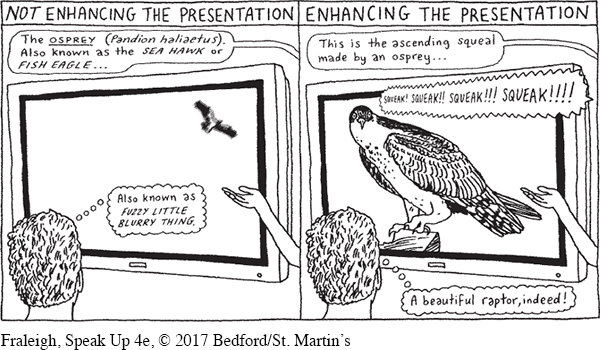Audio and Video
In many speech situations, it can be useful to demonstrate an action that cannot easily be described in words or presented in a still image. In such cases, you may incorporate audio selections or video clips into your presentation to explain, demonstrate, or illustrate a key point. We discuss several means of sharing audio and video, as well as practical considerations for doing so, in the section on technology. But first, let’s consider the circumstances in which this type of content is most useful.
Audio. Presenting sound recordings or effects can greatly enhance a presentation if used well. In a speech about a particular musician or composer, for example, it makes sense to play a recording of his or her work for the audience. Audio also can make abstract concepts easier to understand. For example, Monica prepared a speech about the effects of loud music on hearing. Because loud is a relative term, Monica decided to play audio recordings of different sounds (the engine of a compact car, a radio turned up all the way, a jet engine during takeoff) at different volumes. Although Monica couldn’t subject her audience to a roar as loud as a real jet engine, she arranged the relative loudness of the sounds to demonstrate noise levels by decibel and to help her audience understand the nature of sound and the ways it is measured.
Video. A video is useful to your presentation whenever showing the subject in action or motion would enhance the audience’s understanding more than showing a still photo or describing the subject verbally would. For example, a photograph depicting alpine ski racer and Olympic gold medalist Lindsey Vonn would identify her as a world-
In the same vein, video may be a better choice for your presentation aid if a moving image can better capture the scene or setting. For example, a photograph of a redwood tree on fire might be useful in a speech about forest fires, but a digital video of a burning tree could better demonstrate how quickly a fire can spread.
Page 415

Not all video clips are useful. Video works best when it is clear, compelling, and easy to see. For example, Meg is a bird-